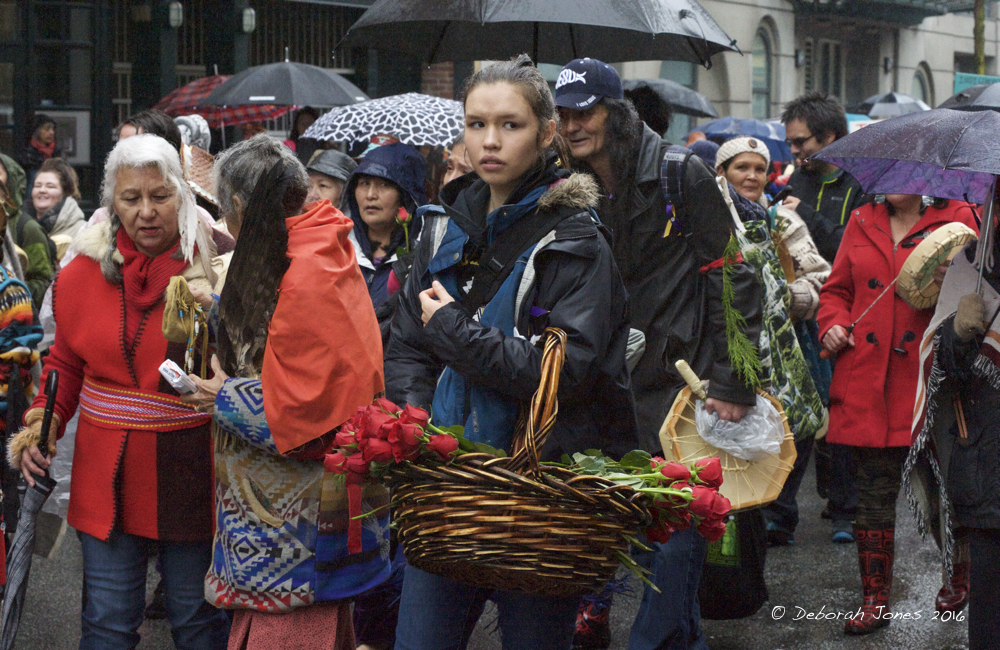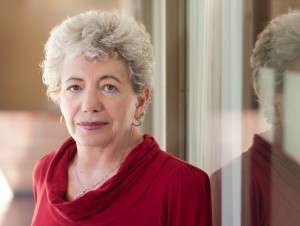
PENNEY KOME: OVER EASY
August, 2016
“The killing has to stop,” said Nicole Robertson, naming the most urgent goal of Canada’s inquiry into Missing and Murdered Indigenous Women (MMIW) at a panel discussion in Calgary.
Robertson, a Cree, won the 2009 Aboriginal Woman Entrepreneur Award of Distinction for her media work, and also has a daughter old enough to attract attention from the police as well as from men she doesn’t know. “I monitor how she dresses,” she said. “I scan crowds to see if a man is paying attention to her.”
“First Amnesty fought to find out what happened to 600 Stolen Sisters, then the figure was 1,200, and now the inquiry is saying the number is more like 4,000,” said diversity strategist Deborah Green, also Cree with a strong Piapot connection. One of the missing women belongs to her family.
“Thirty-four years ago,” she said, “the police came to my house and picked up my aunt. They drove her out to the edge of the city, in the middle of winter, and threw her out of the car. She froze to death, trying to reach a farmer’s house.” Such police excursions were so common they had a nickname: “starlight tours.”
The discussion was held two short days after the August 14 shooting death of Colten Boushie in a farmyard near Biggar, Saskatchewan, in disputed circumstances. So there was some tension in the air, mainly in the discussions around who should investigate the RCMP.
While the First Nations participants recognized moderator Jill Croteau as a media ally, somebody who is interested in Indigenous stories, they also asked her some tough questions. Robertson, another media specialist, asked “Jill, do you ever question what the police tell you?”
Croteau paused and acknowledged, “You have that default trust in authority. But as journalists, we’re supposed to be critical.” She paused again. “I didn’t really feel that shred of distrust until the Robert Pickton story. Sex trade women had told police over and over about this guy, and the police did nothing. They could have saved so many lives. I guess I feel there has to be accountability, and that’s our job as journalists.”
Green added, “There are other media too. There are Aboriginal media like APTN. And social media are powerful. Think, though. If four white boys drove a tractor onto a reserve looking for help and one of them got shot, what would the coverage be like?”
“The media are who they are because of who’s at the table,” contributed the fourth person on the panel, the Hon. Richard Feehan, Alberta provincial Minister of Indigenous Relations. “The families of the murdered and missing women need to have a voice, but not only them. Every community needs to have a voice. We need to start asking Indigenous communities, ‘Who does speak for you?'”
Feehan pointed out that the MMIW inquiry is the first truly national inquiry, in that every province and territory will undertake their own inquiry at the same time. He noted that the inquiry’s mandate is quite open and sweeping, including “systemic causes” and “historical, social, economic, institutional or cultural factors.”
They’re directed to examine the impacts of policies and practices of government institutions, including “policing, child welfare, coroners and other government policies/ practices or social/economic conditions.” The inquiry also has the power to call witnesses and to compel them to testify.
Four out of five commissioners leading the inquiry are women; four out of five identify as First Nations. The Honourable Marion Buller, Chief Commissioner, is a B.C. Provincial Court Judge, from Mistawasis First Nation, Saskatchewan. Commissioner Michèle Audette is a former President of Femmes autochtones du Québec (Québec Native Women’s Association), based in Mani Utenam, Québec. Commissioner Qajaq Robinson grew up in what is now Nunavut and, as a lawyer, works with a special 70-person Team North dedicated to First Nations issues. Commissioner Marilyn Poitras teaches law at Saskatoon, Saskatchewan and has shown a lifelong passion for First Nations issues. Finally, Commissioner Brian Eyolfson hails from the Couchiching First Nation (Ontario) and now serves as acting deputy director, Ontario Ministry of Aboriginal Affairs, Legal Services.
Richard Feehan pointed out that the Inquiry needed so much expertise because the issue was buried for so long and only came to light after First Nations families agitated and demonstrated and raised a fuss for more than a decade. “I want to thank the First Nations women and their families for their persistence,” he said. He praised the new inquiry commissioners for agreeing to serve on such a demanding team.
Globalfest panel members spent some time discussing whether the MMIW inquiry would really make a difference. They pointed out deep-rooted stereotypes about Native women and First Nations people generally, that have proved hard to clear away. Still, as mothers, Green and Robertson said they are constantly working towards the day when their daughters can be safe walking alone after dark, regardless of why they are out walking.
“Not in my lifetime,” said Green, “and maybe not in my daughter’s lifetime, but I hope someday Indigenous women will not be at risk for simply being in Canada.”
Indigenous women can’t do the job alone, said Richard Feehan. “This is a Canadian tragedy,” he said, “and if you’re a Canadian, that’s you. The commission can’t make the past disappear. It’s the community that will make things change. So come do your part!”
Copyright Penney Kome 2016
Contact: komeca AT yahoo.com Read more F&O columns by Penney Kome here
Links:
Government of Canada Launches Inquiry into Missing and Murdered Indigenous Women and Girls, press release: http://news.gc.ca/web/article-en.do?nid=1023999
Related on F&O:
Canada’s National Aboriginal Day, by Deborah Jones
Time, some vast and today unfathomable sweep of time, may eventually heal the wounds in the people, families and communities left by Canada’s treatment of its first peoples; of even the theft, abuse and murder of generations of children. For now, on the first day of summer each year, Canada celebrates National Aboriginal Day.
Canadian Court Expands Aboriginal Rights. By Deborah Jones (archives, 2014)
Canada’s top court greatly expanded aboriginal rights in Canada’s westernmost province, in what may stand as a landmark decision affecting control of a vast swath of land and resources, in British Columbia and beyond. The case, Tsilhqot’in Nation v. British Columbia, was sparked in 1983 when the provincial government licenced a commercial company to log the Chilcotin. The licence was disputed by the Chilcotin residents who lived there long before the mid 1800s when — without their consent — England claimed the land as a colony, and named it British Columbia.
The Case of the Serial Killings: Gruesome details in Pickton pig farmer trial. By Deborah Jones. (archives, 2007)
Wedged between white-capped mountains and sparkling blue ocean, Vancouver is lauded for multicultural livability, ranked worldwide as a top travel destination and is preparing to host the 2010 Winter Olympics. But lately a grim pall has blanketed the western Canadian city of 2.2 million, for reasons far worse than the freak winter storms. The harrowing details of a grotesque serial killer case are bringing to the surface the city’s seamy underworld, usually confined to the squalid 10-block open drug and sex market known as the Downtown Eastside. The seaminess surrounds the trial of pig farmer Robert William Pickton, charged with murdering 26 drug-addicted prostitutes.
~~~
 Penney Kome is co-editor of Peace: A Dream Unfolding (Sierra Club Books 1986), with a foreward by the Nobel-winning presidents of International Physicians for Prevention of Nuclear War.
Penney Kome is co-editor of Peace: A Dream Unfolding (Sierra Club Books 1986), with a foreward by the Nobel-winning presidents of International Physicians for Prevention of Nuclear War.
Read her bio on Facts and Opinions.
Contact: komeca AT yahoo.com
~~~
Facts and Opinions is a boutique journal, of reporting and analysis in words and images, without borders. Independent, non-partisan and employee-owned, F&O is funded by you, our readers. We are ad-free and spam-free, and we do not solicit donations from partisan organizations. Please visit our Subscribe page to chip in at least .27 for one story or $1 for a day site pass. Please tell others about us, and follow us on Facebook and Twitter.

